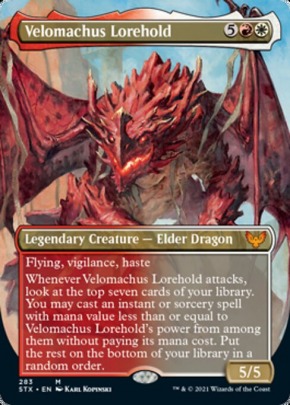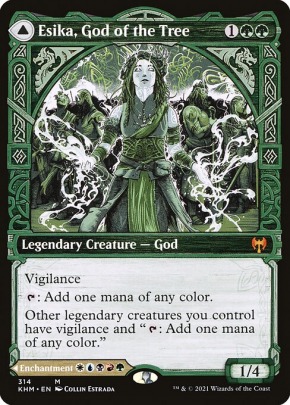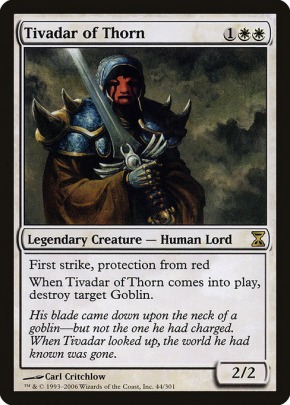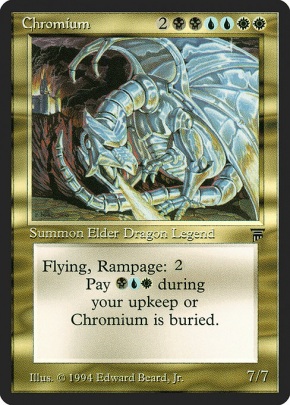Treamayne wrote: ↑8 months ago
I neither want nor expect anybody's opinion or playstyle to change - but I do hope to help some hardline competitive "play to win" people to, at least, understand those of us on the other side of the fence-turned-chasm that is a part of the casual-competitive debate.
Does that make sense to anybody other than me?
We've established that a person being "competitive" means that they're invested in winning the game. That is not a necessary prerequisite for someone to care about the game maintaining its integrity. I posit that nearly everyone cares about the game maintaining its integrity to some degree, it's just that some people have a greater tolerance for intentional misplays before the game starts to feel unsatisfying. Hence my examples with opponents doing essentially nothing - everyone can probably agree that those sorts of games would be unsatisfying, even if they "did the thing". So we agree that some level of competition is necessary, we're just haggling over how much competition is necessary.
DirkGently wrote: ↑8 months ago
I don't mean literally putting a number on it except as a thought experiment, but do you not have a general vibe for how likely you are to win the game?
Nope. At least not until near the end of the game. Last turn or two - maybe. I just don't think about it - for or against. I think about what threats are showing, what they might indicate, what resources I have available and what my next turn might look like. In some situations, I may consider what I need to draw into or dig for.
I honestly find that very hard to believe. When you've got a massive board advantage, no part of you is thinking "I think I'm likely to win this game"?
I guess it doesn't really matter, I just find it very weird. How do you know who to target if you have no idea who is the biggest threat to win the game?
As for what I meant, I was trying to clarify your earlier discorse because it did sounded like you are re-evaluating the order of player threat/position for most cards and game actions. I was stating that I do not operate that way (except the previously mentioned splash plays/combo warnings).
The original point I was making doesn't really require that you personally are updating your estimation of the chance to win the game - it's only necessary that each player has a % chance to win the game. Of course actually calculating it would be extremely difficult, but we're in hypothetical land so we don't need to worry about the details. It's sufficient to establish that you have a % chance based on playing optimally, and making suboptimal plays lowers that chance.
DirkGently wrote: ↑8 months ago
Based on your knowledge and understanding of the hypothetical game state in which you are playing, you believe that one move gives you the best chance to win the game, and a different moves gives you the best chance to "do the thing". Which move are you picking?
That is far too generic for any reasonable answer. It is situation dependant. I can provide some examples - with the caveat that these examples are, to me, only recognizable in hindsight as to thier effect on the game's final outcome.
Given this deck:
U Toothy Snow Illusions_Nexus.jpg
Example 1: WIth
Krovikan Mist (3/3),
Toothy, Imaginary Friend (5/5) and some other illusion I don't remember, an opponent cast
Garruk, Caller of Beasts and +1ed. The most likely optimal play would have been to
Phyrexian Splicer flying onto Toothy and kill it dead. I felt it reasonable that preventing the next turn's -3 was sufficient and instead advanced my board state. I sent Krovikan Mist at Garruk, sent Toothy at the creatureless (nominally) weakest player and
Moonblade Shinobi'd Toothy for the draw and the illusion token. (The other players also did not finish Garruk off, who went on to "doubling season proliferate" and got 2 or 3 free creatures before Garruk was killed off)
Example 2: I'd cast
Spark Double targeting
Toothy, Imaginary Friend and planning to
Crystal Shard Toothy before my next turn (getting draw and an equal amount of counters on not-Toothy), but an opponent with
Avacyn, Angel of Hope overextended (tapped out to counter a different player trying to exile her - IIRC it was a GAAIV deck) and I had the opportunity to shard their Avacyn instead allowing the active player to WoG.
Are those the types of situations you meant?
Not as written, no. In both cases it sounds from your description like you thought you were taking the correct line, and maybe have been wrong (though it's not clear if that's true either?).
If you're making a good-faith effort to make your best move, there's no issue.
A clear example that fits the criteria would be if you have lethal on board, and choose not to take it because you want to win in the way your deck is "supposed" to.
An example that involves the prodigal disenchant would be if a powerful opponent was being held down by a
Winter Orb, but the winter orb was also preventing you from "doing the thing" you want your deck to do. You choose to disenchant the winter orb, even though you know it will likely result in the powerful opponent winning (for sake of argument, while the winter orb is up, the game is pretty balanced).
You seem to want me to make your point for you. I'm sorry, but I cannot do that. As mentioned above, I rarely notice if any given decision is this kind of dichotomy. I won't repeat the previous post you quoted - but that is the extent of my most common assessment. I don't go through that process then think "is there a different play that yields a better chance of winning?" because I don';t care about that. Threat, combo, goal. Done. The example above shows that when I am setting up a goal, if a play presents itself I may take it - but I am not actively searching for "the better play." Sorry.
To me that just sounds like you're using an oversimplified heuristic. Not that you're intentionally taking the weaker line.
Someone could literally Lightning Bolt themselves in the face at 2 life, but if all their opponents concede while it's on the stack, then they haven't thrown the game? That seems absurd to me.
Is this another example of hyperbole-for-effect? Because it feels like mocking (though your previous posts indicate you may not have meant it that way). Do you realize these unrealistic scenarios weaken every argument based upon them?
What? I'm not even arguing with you in that paragraph - I'm arguing with the dictionary definition of "throwing the game", which as written would not include absurd cases such as the one I outlined, even though I think most people would agree that bolting yourself for lethal is "throwing the game", even if your opponents concede.
I find it massively vexing that you take these arguments so personally. The argument structure is pretty simple - the dictionary (or you as the case may be) make an assertion - i.e. "throwing the game requires actually losing the game". I test that assertion by examining an extreme example, where it should be more obvious whether the assertion holds or not. If the assertion is true, it should hold true even in the extreme case. If it doesn't, then we can examine why it doesn't hold true in those examples, and potentially revise the assertion.
I.e. you posit "competition is not necessary for me to enjoy a game"
I test the assertion in an extreme example - i.e. "could you enjoy a game with zero competition?"
If you say yes, I could, then congrats, your assertion holds true (though I may find that hard to believe). If you say no, then clearly the assertion is inaccurate in some way, and it should be revised. i.e. "some competition is necessary for me to enjoy a game, but it doesn't need to be particularly stiff competition".
I really don't understand how you could perceive this as "mocking".
This seems like we are closer here at understanding each other's position. I also beleive that throwing a game requires the intention to do so. Though I'm not sure how or why somebody intends to lose. The closest personal example I can think of is active non-concession (briefly, a few games where one player "combos" in a way that will take multiple turns to close out the game. Usually the other players will concede. I will not concede, but I do play as little as possible, as quickly as possible to keep time on my MTGO clock just to watch them struggle with clicking though hundreds of triggers before their time runs out).
To be clear, when you stated your definition for throwing the game, you said:
To me, "throwing a game" is intentionally making plays that either 1) make it so that I cannot win - or - 2) help ensure somebody else is more likely to win.
Which says nothing about an intention to lose.
But I will avoid using the phrase "throwing the game" since I don't think there's much point in arguing about the definition, and use precise language - i.e. intentionally making a less optimal play. That should make it easier to stay on the same wavelength.
But I will point out that "wrong target" might be how you see it, but not how I (and presumably many others) see it. Just because I chose a valid target that might not have been the, subjectively, best target - does not make my choice the wrong target.
There does exist a "correct target", but failing to choose it doesn't mean you intentionally misplayed. From what you've said, it sounds like you're just using a bad heuristic. There's no issue with that - everyone misplays.
I'm guessing you hate gray areas. Why do you assume a deck's goal has to be "unrelated to winning" simply if it is not played in a competitive style.
I don't assume that, I'm just using an example where it happens to be true.
As a reminder, here is what I said (assuming you are referencing the same snippit of conversation):
Treamayne wrote: ↑8 months ago
However, the difference (to me) is that I am basing my decisions in what helps me "do the thing" and doing the thing may or may not result in me winning. I don't care if I win - I care if I had fun.
Please note I never said the goal (or "thing") was unrelated to winning - only that in playing toward my goal may not result in winning and I don't care if it does or does not.
Take, for example, the previously referenced deck. Most Toothy decks want to "draw tons and Voltron Toothy for a commander damage win" and I thought - "that's lame and overdone - how can I use Toothy differently" and so I conceived Illusion Tribal and focused on bouncing Toothy as my draw engine.
How is that "unrelated to winning?"
I'm only talking about play, not about deck construction. Build those funky brews. FFS, I had a deck that revolved around exploiting
Sorrow's Path.
If you're focusing on achieving your deck's goal as a heuristic to win the game, there's no issue there. It's only an issue if you're choosing to focus on the deck's goal instead of winning when you believe they would follow different plays.
I can see why you feel this way - but it is still applying an assumption that is not universally applicable (bolded above). I simply don't evaluate each play on a scale of "chance of victory." It's not in my crosscheck, and it's not how I approach a game.
I think you're getting a little hung up on this idea of calculating your chance to win. I don't literally mean doing that. A perfect player would use that method - take every piece of known information, calculate the chance to win after making whichever plays are available, and following the play that gives the highest chance. But nobody is a perfect player, and that's obviously impractical to do literally, at least the vast majority of the time. In reality we're usually using heuristics and vibes to approximate the optimal plays, which will inevitably result in mistakes. That's not a problem. The only problem is when you're intentionally making mistakes.
I'm not "Making intentionally suboptimal plays" because I am also not trying to identify a theoretical optimal play. I don't expect you to change your drive for finding optimal plays as often as possible, but please don't apply an A/B false dichotomy to a situation that for many players is a an X,Y,Z axis of possiblities.
If you aren't aware of (what you believe to be) a better play, then there's no harm.
Don't get hung up on a literal "optimal play". Nobody is making perfectly optimal plays, not in a format as complex as commander. We're just making better and worse plays.
Dragonlover wrote: ↑8 months ago
This feels like a hell of a lot of words being used to arrive at the point of "build casually, play competitively".
I'm only talking about playing, not building. Build however you want.
But yeah, play competitively.
As to the original question posed in the thread, we scoop at sorcery speed. If I ever had to scoop pre combat, I'd allow damage triggers from attacks off my ghost for that turn.
Dragonlover
That wasn't the question though.
yeti1069 wrote: ↑8 months ago
Few people I've played with at non-cEDH tables have felt this way. I have often played with people who will tutor for a non-game-winning card when there's the possibility of winning due to it feeling too early in the game for that. I'll note that the idea of just closing the game quickly and moving on to the next with a weaker deck really only applies if you play with a regular group--if you're playing pick-up games at a store or on spelltable, there may not
be a next game with those players, and either way that can lead to bad feelings. I can't tell you how many games I've had, from both sides, where someone comboing off or overwhelming the table early has resulted in a lot of salt. Players don't like to feel like they didn't have a chance, so leaving open that chance at times will result in a more enjoyable experience for everyone.
Most times when I play pickup games, the pod stays together for multiple games unless people have to leave. I guess that might vary if it's a structured event of some kind. No idea how spelltable works.
Of course people don't want to get steamrolled, but the solution is to accurately match power levels. Otherwise you're basically racing against their go-karts with your formula 1 car, and pumping the breaks to make them "feel" like they're competing. That's not a satisfying way to race and it's not a satisfying way to play. Instead, talk to your opponents and work it out.
"Just play honestly" in part implies that everyone is playing exclusively to win (and play optimally), yet that isn't the case for a lot of players. Some aren't playing to win at all (and I can't stand playing with them), while others are playing to win, but not trying hard for it, or taking their time to get there.
Everyone's purpose for playing can be whatever they want. I'm only saying people should make what-they-believe are the best moves as a matter of procedure. Intentionally misplaying is dishonest imo.
I'm also not talking about letting them win--I can make suboptimal choices and still win, potentially. It's just leaving the game open for the fight.
It's a matter of degrees. I think most everyone would agree that playing against opponents who are literally making zero effort to win would be unsatisfying. Playing against opponents who are only intentionally misplaying a little bit is only a little bit unsatisfying.
But I do think it's a bit of a pandora's box - once someone's aware that you're intentionally misplaying at all, it's going to taint all their future accomplishments while playing against you.
As for dropping tutors and combos, or playing weaker decks, again, outside of a dedicated group it can be hard to match power levels across multiple games. If I fully tune-down my decks and end up at a table where everyone is playing stronger stuff, then I may not get to enjoy the game. It's easier to have the option, but not use it, than to need it, but not have it. That said, I have taken most tutors out of most of my decks, and have cut most/all combos (and combos can only be comprised of independently synergistic pieces). My Sefris deck, for instance, runs Reveillark, Karmic Guide, Viscera Seer, and Yawgmoth, because all are great in the deck, but it's rare for me to assemble the combo. Part of that is due to having only a couple of tutors in the deck, and often going for something that isn't these, but also because I will hold back on a piece if the table isn't playing for combo wins.
I think the best way to build a deck that has satisfying games across a wide band of power levels is to run a lot of interaction, because interaction is only as good as the things you're stopping with it.
By all means have powerful decks for when your opponents are playing powerful decks. You don't need to cut all the tutors and combos out of every deck. Just don't play the high-powered decks when it's not appropriate.
Perfectly matching power levels is hard, of course, but given the balancing nature of the format I really don't think it's that hard to get "close enough". Maybe someone has an uphill battle and someone else is the clear and present threat - that's okay. Everyone can target the latter to bring them down, and the former gets to feel all-the-more proud if they do manage to win. As long as people are making a good faith effort to find similar power levels I don't think it's too hard. Most of the time you can get a pretty good bead just from looking at the commanders.
I'd say that most people I have played with would feel unsatisfied/salty at a game that ended within the first 4-5 turns, and many would start to check out of a game that goes beyond an hour-and-a-half/two hours. That means having wincons available can be useful for when the game is stretching on too long and needs to end, but deploying them early is going to just lead to salt. I had a game with my Smeagol deck a couple weeks ago with a lot of back and forth, and no clear archenemy, but the store was closing soon, so I when I cast a tutor, I announced that it seemed like it was time to end the game, got a combo piece, and went off. Everyone felt good about it, because it was a game well-fought, not a blowout.
Everyone wants a good, well-fought game. What you're doing, though, is creating a simulacra of one.
I think you've got some of your own hang-ups to work through here. I get it. I feel the same way about my dad sharing "facts" or "info" with me, and that spills over into other interactions (I do really appreciate having the vast stores of all of human knowledge available for reference in an instant).
Nah not really. I'm not even sure my parents did let me win, and if they did it was so long ago I barely remember it. It was more illustrative than literally true.
One thing we did do, my mom would play boggle against me and I'd be considered victorious if I got at least half as many words as she did. I think this works okay. As long as the handicap is established in advance, and then everyone is playing to win within that framework, it's all good.
Dunadain wrote: ↑8 months ago
Maybe I should start a new thread for this, but I'm curios @DirkGently how far does this go? Modern UB mill plays
Hedron Crab and
Ruin Crab. An inside joke with the deck is to attack with the crabs when you don't think you need them untapped and they won't die in combat. It's hard to call this anything besides an intentionally suboptimal play, but the margin is so small that many people do it anyways because it's fun. Even "spikes" (I agree that the 3 types of players is a load of bologna) will do this. Heck, I've done it with money on the line (not much, but still).
For the record, I'm mostly on your side, I want my opponents to try to win, and if you ever find yourself holding back in a game, then you probably shouldn't have played that deck. However, surely you can see that their is a line here, and different people are going to draw it a different points. You keep using a reductio ad absurdum, but your argument is equally ridiculous if you take it to the other extreme. Would you get mad at me if I swung my
Ruin Crab at you on t2 on an open board? It COULD matter, but it probably won't and it's funny imo.
Heck, resigning to a storm player going off is also suboptimal.
Interesting question. I do think it all exists on a continuum, and a very small misplay makes the game very slightly less satisfying. At the sort of level you're talking about, it's probably too small to make much appreciable difference (assuming that the assumption that you won't need it as a blocker is reasonable, idk %$#% about modern). I also think that the blatantness of it works in its favor. When you suspect your opponent has chosen not to tutor a win when they could have, that's going to make you question the legitimacy of all your accomplishments against them. When someone does a silly meme move, I don't think you're going to worry that they might be coddling you. You might be slightly annoyed that they're not taking the game seriously, but I don't think you'd worry about it extending beyond the extremely visible circumstance.
I do also think 1v1, especially in a tournament setting, is a bit of a different beast. Commander is 100% for enjoyment, whereas tournaments there's the element of stakes. If I think my opponent is intentionally misplaying, to a certain extent, I'm thinking "well, the game has become less satisfying, but I do want to win prizes, so..." It's also less of a cultural thing. Hardly anyone is out there entering modern tournaments in order to help their opponents win. In commander, intentionally misplaying is a lot more common.
Personally I will scoop against a storm player in commander, especially if I think they're pubstomping, to intentionally make the game less satisfying for them (so long as I'm reasonably confident that they've won). "Oh, you wanted to play a tiered storm deck against a bunch of jank so you could go off unopposed? Well enjoy doing it to an empty table, jackass."
But if you're talking about modern storm, I assume time is part of the reason to scoop. I've scooped draft games because I'm pretty sure I've lost game 1, and if I want to win the match we need to finish 2 more games. Lose the battle to win the war.
@PrimevalCommander It sounds like your opponents have a high tolerance for intentional misplays. But I think they'd enjoy the game more if, instead of holding yourself back, you cut the things you feel you need to hold back.
It's like the go-karts and the formula car example. Maybe your friends are okay with you slamming the brakes on your formula car whenever you get too far ahead of their go-karts. But I think they'd have more fun if you were also in a go-kart and racing as fast as you could.
But the cards are so impactful to my strategy I couldn't remove them.
I don't get this. It's easy. Just take the cards out of your deck.
Not everyone feels the burning urge to always go for the throat 100% of every matchup.
Sigh...I'll say it again. I'm not talking about being super invested in who wins the game. You can play for whatever reason you want. Playing to win is a matter of procedure, just like following the rules. I don't have a burning desire to follow the rules. I just do it because that's what your supposed to do when you're playing magic.








